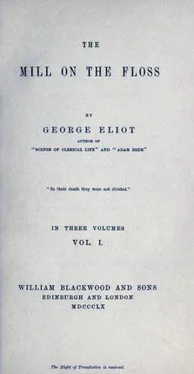"I stole out," said Lucy, almost in a whisper, while she sat down close to Maggie and held her hand, "when papa and the rest were away. Alice is come with me. I asked her to help me. But I must only stay a little while, because it is so late."
It was easier to say that at first than to say anything else. They sat looking at each other. It seemed as if the interview must end without more speech, for speech was very difficult. Each felt that there would be something scorching in the words that would recall the irretrievable wrong. But soon, as Maggie looked, every distinct thought began to be overflowed by a wave of loving penitence, and words burst forth with a sob.
"God bless you for coming, Lucy."
The sobs came thick on each other after that.
"Maggie, dear, be comforted," said Lucy now, putting her cheek against Maggie's again. "Don't grieve." And she sat still, hoping to soothe Maggie with that gentle caress.
"I didn't mean to deceive you, Lucy," said Maggie, as soon as she could speak. "It always made me wretched that I felt what I didn't like you to know. It was because I thought it would all be conquered, and you might never see anything to wound you."
"I know, dear," said Lucy. "I know you never meant to make me unhappy. It is a trouble that has come on us all; you have more to bear than I have — and you gave him up, when — you did what it must have been very hard to do."
They were silent again a little while, sitting with clasped hands, and cheeks leaned together.
"Lucy," Maggie began again, "he struggled too. He wanted to be true to you. He will come back to you. Forgive him — he will be happy then—"
These words were wrung forth from Maggie's deepest soul, with an effort like the convulsed clutch of a drowning man. Lucy trembled and was silent.
A gentle knock came at the door. It was Alice, the maid, who entered and said,–
"I daren't stay any longer, Miss Deane. They'll find it out, and there'll be such anger at your coming out so late."
Lucy rose and said, "Very well, Alice, — in a minute."
"I'm to go away on Friday, Maggie," she added, when Alice had closed the door again. "When I come back, and am strong, they will let me do as I like. I shall come to you when I please then."
"Lucy," said Maggie, with another great effort, "I pray to God continually that I may never be the cause of sorrow to you any more."
She pressed the little hand that she held between hers, and looked up into the face that was bent over hers. Lucy never forgot that look.
"Maggie," she said, in a low voice, that had the solemnity of confession in it, "you are better than I am. I can't—"
She broke off there, and said no more. But they clasped each other again in a last embrace.
Chapter V. The Last Conflict
In the second week of September, Maggie was again sitting in her lonely room, battling with the old shadowy enemies that were forever slain and rising again. It was past midnight, and the rain was beating heavily against the window, driven with fitful force by the rushing, loud-moaning wind. For the day after Lucy's visit there had been a sudden change in the weather; the heat and drought had given way to cold variable winds, and heavy falls of rain at intervals; and she had been forbidden to risk the contemplated journey until the weather should become more settled. In the counties higher up the Floss the rains had been continuous, and the completion of the harvest had been arrested. And now, for the last two days, the rains on this lower course of the river had been incessant, so that the old men had shaken their heads and talked of sixty years ago, when the same sort of weather, happening about the equinox, brought on the great floods, which swept the bridge away, and reduced the town to great misery. But the younger generation, who had seen several small floods, thought lightly of these sombre recollections and forebodings; and Bob Jakin, naturally prone to take a hopeful view of his own luck, laughed at his mother when she regretted their having taken a house by the riverside, observing that but for that they would have had no boats, which were the most lucky of possessions in case of a flood that obliged them to go to a distance for food.
But the careless and the fearful were alike sleeping in their beds now. There was hope that the rain would abate by the morrow; threatenings of a worse kind, from sudden thaws after falls of snow, had often passed off, in the experience of the younger ones; and at the very worst, the banks would be sure to break lower down the river when the tide came in with violence, and so the waters would be carried off, without causing more than temporary inconvenience, and losses that would be felt only by the poorer sort, whom charity would relieve.
All were in their beds now, for it was past midnight; all except some solitary watchers such as Maggie. She was seated in her little parlor toward the river, with one candle, that left everything dim in the room except a letter which lay before her on the table. That letter, which had come to her to-day, was one of the causes that had kept her up far on into the night, unconscious how the hours were going, careless of seeking rest, with no image of rest coming across her mind, except of that far, far off rest from which there would be no more waking for her into this struggling earthly life.
Two days before Maggie received that letter, she had been to the Rectory for the last time. The heavy rain would have prevented her from going since; but there was another reason. Dr. Kenn, at first enlightened only by a few hints as to the new turn which gossip and slander had taken in relation to Maggie, had recently been made more fully aware of it by an earnest remonstrance from one of his male parishioners against the indiscretion of persisting in the attempt to overcome the prevalent feeling in the parish by a course of resistance. Dr. Kenn, having a conscience void of offence in the matter, was still inclined to persevere, — was still averse to give way before a public sentiment that was odious and contemptible; but he was finally wrought upon by the consideration of the peculiar responsibility attached to his office, of avoiding the appearance of evil, — an "appearance" that is always dependent on the average quality of surrounding minds. Where these minds are low and gross, the area of that "appearance" is proportionately widened. Perhaps he was in danger of acting from obstinacy; perhaps it was his duty to succumb. Conscientious people are apt to see their duty in that which is the most painful course; and to recede was always painful to Dr. Kenn. He made up his mind that he must advise Maggie to go away from St. Ogg's for a time; and he performed that difficult task with as much delicacy as he could, only stating in vague terms that he found his attempt to countenance her stay was a source of discord between himself and his parishioners, that was likely to obstruct his usefulness as a clergyman. He begged her to allow him to write to a clerical friend of his, who might possibly take her into his own family as governess; and, if not, would probably know of some other available position for a young woman in whose welfare Dr. Kenn felt a strong interest.
Poor Maggie listened with a trembling lip; she could say nothing but a faint "Thank you, I shall be grateful"; and she walked back to her lodgings, through the driving rain, with a new sense of desolation. She must be a lonely wanderer; she must go out among fresh faces, that would look at her wonderingly, because the days did not seem joyful to her; she must begin a new life, in which she would have to rouse herself to receive new impressions; and she was so unspeakably, sickeningly weary! There was no home, no help for the erring; even those who pitied were constrained to hardness. But ought she to complain? Ought she to shrink in this way from the long penance of life, which was all the possibility she had of lightening the load to some other sufferers, and so changing that passionate error into a new force of unselfish human love? All the next day she sat in her lonely room, with a window darkened by the cloud and the driving rain, thinking of that future, and wrestling for patience; for what repose could poor Maggie ever win except by wrestling?
Читать дальше












